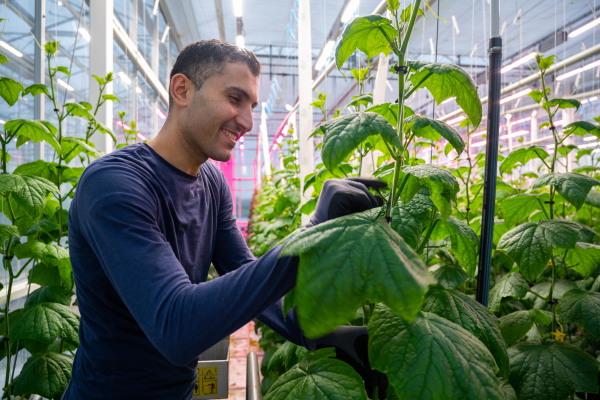Fluence has expanded its global photobiology research program, which encompasses studies on multiple vine crops, leafy greens and medical cannabis in the United States, Canada, Germany, Belgium and the Netherlands.
Tapping into a global network of trusted research institutions
Fluence leverages a network of leading research institutions and partners for its program, including Wageningen University & Research (WUR) for tomatoes; Proefstation voor de Groenteteelt (Proefstation) to study cucumbers; Harrow Research and Development Centre for peppers; The Technical University of Munich's Greenhouse Lab Centre for lettuce; Wageningen Plant Research’s Greenhouse Horticulture business unit and Compassionate Cultivation for medical cannabis.

The latest studies utilized Fluence’s VYPR Series top light and expanded PhysioSpec spectra offering—which features four spectra and efficacies up to 3.8 µmol/J—in a randomized block design with triple replicates during a winter growing season. WUR explored the impact of each spectrum on Merlice and Brioso tomato cultivars.
“Traditionally, tomato plants are grown under high-pressure sodium lights, where only one spectrum is available to growers,” said Ep Heuvelink, associate professor of horticulture and product physiology at WUR. “Given the efficacy of Fluence's LED solutions and the company's spectra options, it’s critical to understand how various tomato cultivars perform under LEDs and diversified spectra.”
Featuring a 1.3-hectare greenhouse with 38 independent compartments, Proefstation’s facility brings more than 50 years of experience in research on the cultivation of greenhouse and field vegetables.
“Light spectra have an important impact on plant and fruit quality, and we’ve found that LEDs provide a more optimal, precise spectrum than HPS,” said Jonas De Win, lead cucumber researcher at Proefstation. “This research is critical for our growers who frequently ask which spectra is best for their greenhouse and crop variety. Our goal is to act as the bridge between cucumber growers and the latest scientific research, enabling cultivators to enhance their environments and ultimately become more profitable.”
Crop-based research results inform unique lighting strategies
“LED lighting is a proven, viable option for global crop growers,” said David Cohen, CEO of Fluence. “Our exploration of the impact of light quality on plant development is driving a deeper conversation about efficacy, yield and quality between growers and their partners. Our commitment to leading cross-geography, multi-crop research will help guide growers in building a supplemental lighting strategy tailored to their unique business goals.”
Fluence will distribute research results throughout the year, uncovering how the optimal lighting strategy varies by crop, species and environment. Results from Fluence’s cucumber trial with Proefstation will be previewed on July 15, 2020 on a webinar hosted by Leo Lansbergen, Fluence’s horticulture service specialist and expert in cucumber cultivation.
“There is no one-size-fits-all approach to determining your lighting strategy,” said David Hawley, Ph.D., Fluence’s senior scientist. “Exploring how to manipulate LED technology presents a world of opportunity for us as scientists, but ultimately benefits growers looking to customize their cultivation environments. Insights derived from each study will help growers understand how various spectra impact harvests and plant quality, including factors ranging from nutrition and flavor to shelf life.”
For more information: Fluence
Fluence
www.fluence.science
